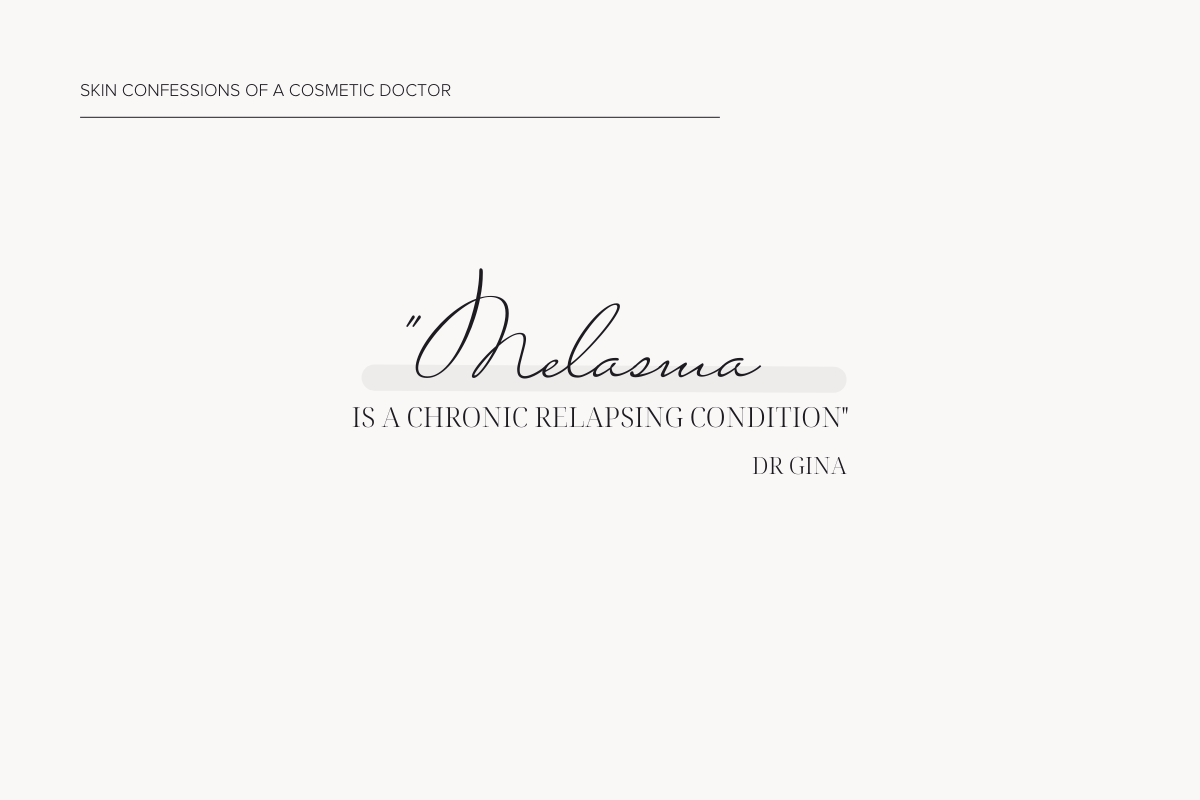
Skin confessions from a Cosmetic Doctor: Melasma
A no-holds-barred look into some of the skin conditions and concerns our team have experienced and suffered with over the years. To start, Dr. Gina Shares a personal insight into her own experience with melasma.
Dr Gina’s story
“Melasma in my 50’s – it’s not fair!
I can remember the day we got lost while doing a track walk in Italy, 2019. It was a hot day and of course, I didn’t reapply my sunscreen throughout the day. Then BANG – the next day while brushing my teeth, I could see the “melasma mustache” coming up. It happened to me!
Since then, I have been super strict with my Melan 130, even if I am only driving two minutes to work (confession never did this before!).
Going back to Egypt, I found that at least four of my cousins on both sides of the family suffer from the condition. Melasma was in my genes.
To help treat my Melasma, I have been using my Melan 130 cream which contains Kojic acid, SA and niacinamide, twice a day, along with my favourite Rational #1 and #3. I also use Empelle for serum and cream for my menopausal skin.
I have also been using salicylic acid peels with my lovely therapists at Ocean Cosmetics. Another recommendation I have for managing melasma is my secret pigment formula of course!
Everyone’s melasma journey is different. I have learned that less is better for my melasma.”
What is Melasma?
Melasma is a chronic condition that Dr. Gina calls the diabetes of cosmetic dermatology – hence the aim to manage and improve, not to treat and get rid of.
Melasma is a multifactorial condition. Some of the causes include:
- UV Light, especially short-wavelength or visible light like purple and blue can bring on Melasma. Dr. Gina warns to never do Blue Light LED Therapy on Melasma as this can worsen the condition.
- Genetics plays a major role in melasma. In fact, 60% of patients who suffer from melasma have a family history of the condition.
- Hormone changes can also bring on melasma. This is more prevalent during pregnancy, and when taking medication used for contraception and menopause. (We do not recommend coming off hormonal medication without speaking with your GP).
- Heat exposure is another trigger for melasma.
Minimising these triggers should be the first point of action when managing melasma.
How do you treat Melasma?
Treating melasma requires multimodalities. Here are some helpful recommendations for managing melasma.
- Wearing SPF and protecting your skin from the sun is not only the easiest, but the most important way to combat your skin from melasma. SPF 30-50 with UVA and UVB should be worn all the time, year-long, and reapplied at midday (even if you are inside – light from computer screens can also trigger melasma).
At Ocean Cosmetics we recommend using Melan 130 as it contains azelaic acid. - A key way to manage your melasma, is to minimise your heat and light exposure. This could mean avoiding being outside on hot summer days.
- The Kligman’s Formula has proven to be the gold standard for treating melasma, with 60-80% of patients reporting improvements. Dr. Gina has modified this formula of pigment inhibitors – and prescribes to patients suffering from melasma “No Secrets”.
- Long-term use and misuse of Hydroquinone can lead to permanent pigmentation called Ochronosis. Don’t forget to take a break!
- Any laser procedures performed in the clinic carry the potential risk of PIH (post-inflammatory hyperpigmentation) and should be preceded by using the pigment inhibitors for at least 6 weeks. Some laser treatments and procedures include Permea laser, Fraxel 1927, Q switch 1064, Tixel, Cosmelan or Dermamelan peels, or simple SA peels. There is no magic wand for melasma (yet) – it is important to discover which treatment is right for you.
- There are some oral medications available for managing melasma. Consult with your GP to see if this is the right option for you.
- Topical treatments can be applied to help improve the skin barrier. A strong barrier is important as all strong pigment inhibitors are irritating and drying.
- Melasma patches can be thick and have poor texture. There are procedures and products that help refine the skin and give general improvements to those suffering from melasma.
Unfortunately there is no cure for melasma, and relapse is common. Luckily we have a range of different recommendations to help manage and minimise this condition. Speak with one of our experienced skin therapists to help define the best treatment pathway for you.
Call us on 6336 7250 or book in for a consult here!
